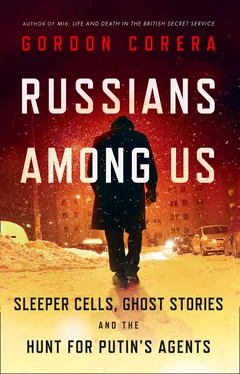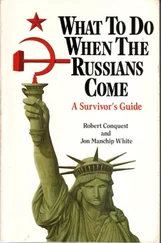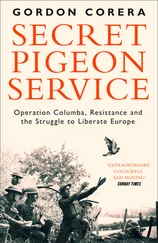From the day he arrived at the Russian mission to the UN, Poteyev had been closely observed by the FBI. They did this to all Russian officials using observation posts, surveillance teams, and bugs. But the FBI and CIA had a particularly good insight into what was going on at the Russian mission to the UN while Poteyev was there. That was because they already had a spy on the inside. Sergei Tretyakov was technically a first secretary but actually the deputy SVR resident since his arrival in 1995. A rotund, outgoing character, Tretyakov was one of those who looked at the SVR in the mid-1990s and saw only decay. When he visited Yasenevo, he remembered how it had grown grimy in his absence. The bathrooms, once spotless, now looked more like you would expect in a railway station. People looked unkempt and were drinking and leaving the office early. Jobs had been cut and many had gone off to make money. Disillusioned, he began working for the Americans and would spend the late 1990s providing highly valuable intelligence, including the names of undercover SVR officers across the United States and their agents.
The two Russians would have known each other, but Tretyakov did not introduce Poteyev to the Americans. Keeping agents separate was a vital principle of tradecraft or else the risk would be that one of them—if discovered or turned—could compromise the other. Tretyakov would, though, have been able to tell the Americans all about the officers in the mission, including Poteyev, which may have aided their understanding of him and whether he could be approached. In October 2000, rather than return to Russia, Tretyakov simply disappeared. SVR operations in North America were dealt a huge blow. But the SVR did not know things were even worse than they feared. There was another spy.
Poteyev was watched for some time by the FBI. FBI teams study every Russian diplomat, building up a file on them. What is their work pattern? Does their routine make them look like a real diplomat or might they be a spy? What kinds of things do they do in their spare time? As well as hoping to catch them in the act of espionage (always difficult), the counterspies are looking for “the hook”—the aspect of their life you can cast your line toward and hope it catches so you can reel them in. Sometimes they will be overheard on the phone talking in a way that sounds like high-minded ideological disillusionment but other times it is because they are observed gazing longingly at large plasma screen TVs in shop windows as they walk downtown.
What motivates such people to turn against their country and spy? Occasionally in the Cold War there were genuine ideological turncoats. But money and general disillusionment were more of an issue for Russian spies in the 1990s. They had watched the ideology they had signed up for disappear and their savings evaporate. Some literally became chicken farmers. Meanwhile, they could see others back home cash in in the new world of crony capitalism. Why—after all their service—should they not have some little nest egg to prevent their family from struggling? That was one reason. But the truth is that simple answers rarely suffice. Each case is unique. If you speak to those who target Russians, they say the simple notions of motivation rarely apply. The reality is much harder to unpick. It is sometimes tempting to reduce it all to something like money or grievance or ego. But, one old hand explains, the Russians are complicated. They are all maneuvering in their bureaucracy against each other, sometimes sleeping with each other or their partners, collecting compromising information on each other, and holding grudges for some slight inflicted on them years ago—any of which could lead one of them to suddenly decide to turn. Another former spy has a different take. In post-Soviet Russia it was not the people you expected to turn who did. Rather than unhappy, low-level intelligence officers, it was more senior ones who changed sides. They had got far up the tree but then realized they were not going to go any further since when you reached a certain level, politics and corruption took over and it did not matter how good you were. That was the moment you might be willing to turn.
What was the case with Poteyev? Russian spies would later bitterly attribute Poteyev’s actions to the “unraveling” of the 1990s, when everything was for sale and when security was so lax and no one cared where you got your money or stashed it away. The 1990s were difficult times for Russia’s spies—the old certainties of communism gone, a new, almost alien world back in Russia in which a wild form of capitalism and gangsterism seemed to be flourishing. For old SVR hands, a demoralized service without an ideological compass was vulnerable to its opponents, allowing MI6 and the CIA to have a field day. His former colleagues would claim Poteyev sold them out “banally” for greed, saying the Americans exploited his love of money and alcohol. They would say that he had got fond of life in the United States and its luxuries. There would be talk of shady deals in which Poteyev was involved in money laundering and helping other SVR officers buy homes and move their cash to America. All of this was used by the CIA, the Russians would later say. Much of this was wrong, misinformation, or reflected the bitterness of betrayed colleagues. Here, for the first time, are the outlines of the story.
The recruitment of Poteyev took place in 1999, at the end of his posting. It was not by the CIA but by the FBI’s New York field office. Recruiting Russian intelligence officers inside the United States is the province of the FBI rather than the CIA. In general, the FBI’s job is to catch people breaking the law and the CIA’s job is to break the laws of other countries by stealing their secrets. One side is cops, the other robbers. They have different cultures and relations can be rocky. There was real tension in the late 1990s between the CIA and FBI over counterterrorism, but the relationship in New York on counterintelligence was tighter. New York—with the world of business as well as the UN—was a fertile hunting ground for the bureau’s officers seeking to recruit Russian assets and the FBI’s New York office was big enough to have a critical mass of counterintelligence expertise. “The New York field office is its own world—with its own worldview,” one former FBI counterintelligence officer explains. “Most New York agents believe the sun rises and sets in the New York office,” says another. With so many potential targets in the city, the office had experience and swagger.
The field office is housed at Federal Plaza, a few blocks from the site of the twin towers of the World Trade Center. The counterintelligence team in the late 1990s was housed on the twenty-sixth floor, part of the National Security division, which was headed by the larger-than-life John O’Neill. In 2000, he mislaid a briefcase for a few hours that contained details of counterterrorist and counterespionage cases (perhaps including that of Poteyev). The briefcase incident provided one more excuse for those who did not like his hard-charging style, and he left soon after for a job at the World Trade Center, where he died on September 11, 2001.
The FBI would have seen that Poteyev liked life in America. But that was not a reason to assume he’d be open to spying for the United States. He was pitched by the FBI to see if there was a chance he might turn. This was commonplace. And it had happened with him not just once but again and again. He had declined. But as his posting was coming to an end and he was about to return to Russia, something changed. He decided he was ready. Why? It seems to have been a mix. There was certainly money. Like others in Russia in the 1990s, his pension had been cut drastically. There was also some disillusionment at the way the SVR had acted back home, including on a personal level, failing to support him through some difficult family times, including the death of a relative. But there was also disgruntlement. He wanted to extend his tour in the United States, but his request had been denied by Moscow Center. Poteyev was not quite what is called a “walk-in”—someone who walks in off the street and offers him or herself out of the blue. Rather, it was as his time in New York came to an end that he changed his mind and indicated he was interested. The Russians believe he was recruited in June 1999. US officials will not comment.
Читать дальше












